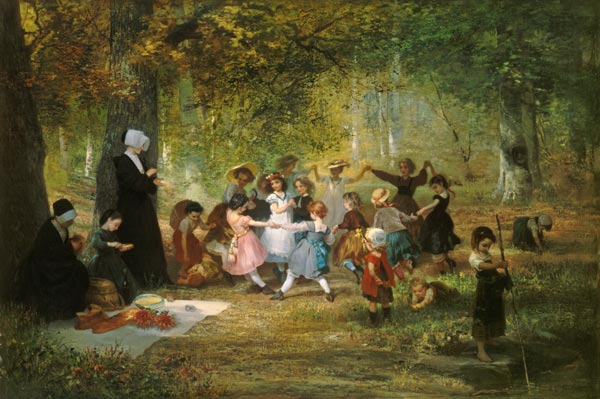Biophilia is the genetic tendency to be emotionally attached to nature. It is funny to think about such a concept and never be consciously aware of its existence. It reminds me of the Pre-Cartesian worldview of Embodied Cognition, in which the human body -- back then made up of Plotemy's and Aristotle's notion of the four elements that correspond with Galen's theory of humoralism -- is but a vessel with a small membrane that fully interacts with its surrounding environment, almost as if that membrane was a sponge soaking in the experiences and actual physicality of objects into one's ontological makeup. This same notion is discussed in a minutely different way in Sustainability's discussion about biophilia and how children and adults can learn to embody its benefits by immersing themselves in the natural world. Although we tend to think that we do have a massive appreciation for nature, more so than most, we tend to never skip our way into the woods like a child building a tree fort in the woods behind his house. Why is that? The Enlightenment spurred a huge division in the thinking of today and the thinking of the Medieval World. Before, philosophers and scientists (natural philosophers) like Kant and Lavoisier and Decartes began to describe the natural world and the differing experiences of man versus the natural world, many people believed that the four elements connected them to their surroundings and affected the emotions they felt and the thoughts they conceived. This same notion is put forth in Robertson's book. She seems to take a lot from the naturalistic vs materialistic dichotomy that we also see in the writings of the famous monk and scholar St. Francis of Assisi. More so, she almost takes directly from Aquinas' notions of a materialistic metaphysical reality in which connects us all to God (in almost pantheistic fashion). If we are connected emotionally and mentally with nature, then, according to Robertson's theories, we also learn in a more beneficial way when we engage with the natural world. The freedom to move and learn at the same time makes biophilia a very real hypothesis that, just like any in vogue theory, demonstrates a nice niche in which humans can connect with their environment. The interesting thing, however, is that this notion is nothing new and in fact is shown in the writing of St. Francis when he refers to his ascetic retreat into the wilderness as a direct connection to his God, which brings fourth an almost Transcendentalist, Emersonesque image of a man who finds himself and his teleology, morally speaking, in his time with nature.

https://thepocketscroll.wordpress.com/2011/09/03/st-francis-and-why-you-like-him/
"Bioregionalism is an approach to living and learning that focuses on the particular bioregion where a person or group of people live. It represents local knowledge and local livelihoods that grow from a particular place." and "Embedded in biophilia is the genetic human need to exploration and discovery, both important elements in problem-solving... Children sometimes need space and silence and should have the option of choosing solitude." (Robertson 2014)
These quotes are instrumental to my understanding of the point being expressed in the chapter and what can be used outside of the text in a very real way. If lacking factual evidence to back up its idealsitic, if a bit manorialistic (this is referring to the Medieval notion of Manorialism in that peasants worked to pay for protection in regional communities. Although manorialism doesn't mirror bioregionalism, it creates a historical discourse with the very same notion in different and similar ways: manorialism was instrumental in creating regional notions of identity during the Medieval period, whereas bioregionalism presupposes that we should begin to identify with our regional surroundings and its uniqueness in order to create a better world,) ideas, Bioregionalism asks us to embed ourselves in the present and into the nature that surrounds us. This creates a link which can bind us to that particular area. Although this is scary for some (myself included), for others this is a very real and fascinating way to live because it means that they have to care about where they live and not take from it and leave for places anew. Although I could never live in such a manner because it doesn't favor my cavalier-like worldview, it different gives to the stationary conservative a platform or base to experience the beauty of the natural world and thus help them learn and ethically connect them with others who are interested in preserving the health of our planet. Bioregionalism gives its readers a sense of hope for the future, that whatever has been done to the atmosphere can be backward engineered through education and working together. This sounds a lot like Moore's Utopia, where the Utopians work in gardens to achieve a mutually competitive goal of protecting their island. Education in his philosophical story is one key element that the Utopians use to achieve their sustainable practices and their balwark of defense, they coexist with their environment, and they do not exploit it. One of the ways chapter 17 attempts to prove this same notion of educational achievement is through its explanation of healthy learning and play environments. Should the child be given an atmosphere in which they take their environment for granted or should they engage with the environment. The latter proves to be true according to Sustainability because, although no research or academic studies are cited for evidence, children learned better in an open,nature-oriented environment, where, if given the proper natural materials, they will use problem solving skills with other children (which isn't really explained in detail, only taken for granted) to build natural shelters where they can find personal solace.

https://www.google.com/search?q=More%27s+Utopia&espv=2&biw=1920&bih=979&source=lnms&tbm=isch&sa=X&ved=0ahUKEwiIuKTnku3OAhVDLyYKHbkPD34Q_AUIBigB#imgrc=6OJrFHUbyVQ-uM%3A

http://www.art-prints-on-demand.com/a/dieffenbach-anton/playing-children-in-the-w.html
In a personal sense, these are very real conjectures, For example, when I was a kid I used to go skiing with my mother, grandfather, and uncles up in Snoqualmie Pass, Washington during the winter. I used to think that I was conquering the treacherous icy hills and snowy mountains, but the truth of the matter is that I was immersing myself into the beauty of the natural world and in the circadian cycle of my day, night, and time schedules. The places I skied became the imprints of my journey through time, in unison with the natural world. And through this process I felt the sadness and the excitement during the best and worst times in life. Sadness because I would never experience the same exact snow formation again, and excitement because nature gave me an avenue toward a knowledgeable future, where I could use the skills I learned while skiing in various other activities such as soccer and studying. In other words, its helped me decipher, to some extent, right from wrong.

https://www.wunderground.com/wximage/mdlpic/239\
Biophilia and Bioregionalsim connect to form a beautiful learning experience when you allow it.
"Various groups choose language to reflect their particular views of reality." (Robertson 2014)
And all too often insist on making moral arguments. For some reason I have a problem with this notion of right, especially considering the liberal mantra of "protecting the rights of the individual." If that is the case, then, does right and wrong -- from a factual standpoint -- really matter? My right is to believe in what my heart tells me to believe. At first glance that sounds very, even banally so,cliche, but a closer look at what I mean shows us that that isn't the case. In fact, what I am saying is that because I am human and believe in the fundamental principle that all humans have a standard equality of belief -- especially considering the notion that crimes against humanity are crimes that take that right away -- then, even if I am a nut job, should be allowed to accept and reject any argument I wish to accept or reject. In this way, language becomes all important. If we look at the campaign of Bernie Sanders and his notion of implementing a Carbon Tax, we find ourselves gazing at a Utilitarian argument which claims, moralistically and on a factual basis, that we should accept a Carbon Tax. But this notion and language goes against the principle that the individual has the right of being an individual. Because whatever I do, it begins with my relationship with something else. This means that I act as an individual every time I choose to act. Therefore, to implement any tax to hault my ability to act is an impeachment of some of the minute rights I hold onto as an individual. I have the right to reject and accept the language and shouldn't be coerced into accepting any form of linguistic reason if I choose not to. The same applies to the other side of the political sphere and the notion of abortion. I wont get into here but the fundamental principle still stands. Why should I be told that I cannot act in a manner I wish to act? Why should you stop me? Part of the reason for being in a society is that we linguistically set boundaries or domains of experience that block us from going to extremes in our actions and behavior. And I think that notion is the beauty of being human. To understand what should be regulated and what shouldn't in accordance with the broader context of humanity. And that is why language is so important.

https://www.google.com/search?q=language+animal&espv=2&biw=1920&bih=979&source=lnms&tbm=isch&sa=X&ved=0ahUKEwiQq_jBlu3OAhUH1SYKHRYHArkQ_AUIBigB#tbm=isch&q=language+animal+taylor&imgrc=HLEh00lMqz_eEM%3A
"Various groups choose language to reflect their particular views of reality." (Robertson 2014)
And all too often insist on making moral arguments. For some reason I have a problem with this notion of right, especially considering the liberal mantra of "protecting the rights of the individual." If that is the case, then, does right and wrong -- from a factual standpoint -- really matter? My right is to believe in what my heart tells me to believe. At first glance that sounds very, even banally so,cliche, but a closer look at what I mean shows us that that isn't the case. In fact, what I am saying is that because I am human and believe in the fundamental principle that all humans have a standard equality of belief -- especially considering the notion that crimes against humanity are crimes that take that right away -- then, even if I am a nut job, should be allowed to accept and reject any argument I wish to accept or reject. In this way, language becomes all important. If we look at the campaign of Bernie Sanders and his notion of implementing a Carbon Tax, we find ourselves gazing at a Utilitarian argument which claims, moralistically and on a factual basis, that we should accept a Carbon Tax. But this notion and language goes against the principle that the individual has the right of being an individual. Because whatever I do, it begins with my relationship with something else. This means that I act as an individual every time I choose to act. Therefore, to implement any tax to hault my ability to act is an impeachment of some of the minute rights I hold onto as an individual. I have the right to reject and accept the language and shouldn't be coerced into accepting any form of linguistic reason if I choose not to. The same applies to the other side of the political sphere and the notion of abortion. I wont get into here but the fundamental principle still stands. Why should I be told that I cannot act in a manner I wish to act? Why should you stop me? Part of the reason for being in a society is that we linguistically set boundaries or domains of experience that block us from going to extremes in our actions and behavior. And I think that notion is the beauty of being human. To understand what should be regulated and what shouldn't in accordance with the broader context of humanity. And that is why language is so important.

https://www.google.com/search?q=language+animal&espv=2&biw=1920&bih=979&source=lnms&tbm=isch&sa=X&ved=0ahUKEwiQq_jBlu3OAhUH1SYKHRYHArkQ_AUIBigB#tbm=isch&q=language+animal+taylor&imgrc=HLEh00lMqz_eEM%3A